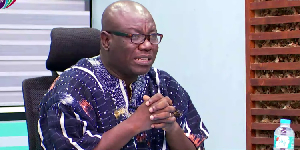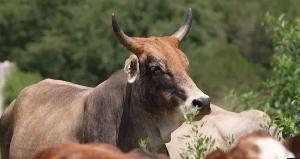JONES’ ‘RIGHTEOUS’ CLASH WITH SAHARA
... Breach of contract glossed over by ex-CEO, and now Akomea
A STORM is yet to settle over the matter involving an irregular contract execution involving tens of millions of dollars between Nigeria’s Sahara Energy Resources and the Volta River Authority (VRA) during the tenure of the fallen Chief Executive Officer, Dr. Charles Wereko-Brobby. The issue pricked the ‘righteous anger’ of Board Chairman Dr. Jones Ofori-Atta.The intricacies of the oil industry and the pall of secrecy and legal complexities are such that even the youthful Minister of Information, Nana Akomea, blissfully ignorant of the oil industry complexities on Wednesday, last week, put his boot in, (actuated by a desire to score a political point against Professor Mills,) when he proclaimed that Sahara was justified in claiming for a breach of contract against VRA.
Sahara is demanding $5.5 million dollars from VRA for missing a laycan (failing to lift oil on a particular time and date) and incurring costs against Sahara. The Chronicle has reported on this in earlier editions.
The Minister also strained to cover other serious matters involving significant losses to the state by questionable decisions taken by the one-time blow man of VRA, Dr. Charles Wereko-Brobby, as they relate to the Strategic Reserve Plant. (The Chronicle will publish a serialisation of the SRP matter.)
Available documentary evidence bearing official imprimatur of VRA and Sahara establishes clearly that Sahara Energy Resources blatantly breached a lawful contract to supply crude oil to the Aboadze Thermal plant in Takoradi with specified light crude oil.
Section 11, sub-section 1 of the legally binding Agreement for Supply of Light crude oil between the offshore Nigerian company, and VRA signed by Wereko-Brobby (and witnessed by Andrews Addy) and Sahara’s Funmilayo Marinho (and witnessed by Ian Randolph,) for year 2002, was very explicit on terms and implied terms.
It states inter alia: “…. The quality of each shipment shall be Bonny light, Brass River and Lion, and shall conform with VRA quality specifications…any shipment in which any of the listed contaminants exceed the indicated limits stated shall be rejected.”
Section 2 also states that “… there are no warranties or guaranties …or suitability of the light crude oil for any particular purpose or otherwise, which extend beyond the description of the LCO and any specifications…”.
Records show that of the several ‘parcels’ of LCO delivered to VRA, a greater number fell outside the specific product named and agreed between both parties, and quiet rightly caught the eagle eye of Jones Ofori-Atta, the Chairman of the Board of VRA. It was a prima facie breach of contract, and could have been grounds for rejection.
Jones then fired a query to Wereko-Brobby who then forwarded a letter to Sahara asking for explanations as to why Sahara varied the terms of the contract without agreement from the Board of management.
But the question that begs for answers are whether Sahara could have dared to vary the terms and substitute the product with one which is different from what had been specified and agreed to in writing without the knowledge and concurrence of the CEO, who had clearly shown his allegiance to Sahara.
The second question was why Sahara continued to charge virtually the same amount of money for the different brand they supplied, less 50 cents, for every barrel of the 15,000 they supplied every day.
In their response to Jones’ query channelled through Wereko-Brobby the Nigerian boys showed their admirable aptitude by drawing attention to their own action against VRA. In the 14th paragraph of the two-page letter dated May 19th, 2003, the Managing Director of the company, Mr. Tonye Cole, reminded Tarzan:
“We also wish to point out that we have been unable to have another reconciliation meeting since the last one in November 2002. Unfortunately,, the issues that came out of that meeting have not been fully resolved and we are still awaiting VRA’s full settlement of our outstanding claim of $5,534,223.89 agreed at the November 2002 meeting.”
Tonye’s letter did all but respond to the specific charge, but danced round the question, indulging in hyperbole and bluster and hype.
‘It is an extremely complex one to respond to as it would involve disclosing certain facts of delicate intricacies encountered in each transaction.’
“It is further compounded by the fact that VRA is not our only client with regard to the sale of Okono, a grade of light crude oil for which we presently have the sole rights of sale and purchases. ‘And for commercial confidential reasons, we cannot provide you with any records.
Despite blatantly refusing to give definite and specific reasons, they still cheekily refuted Jones’ logical suspicion that the crude supplied was cheaper and should have reflected in the price.
Tonye’s response may fool the untutored but was clearly insulting, as he clearly wanted to have his cake and still eat it.
‘… we can categorically state that the issue of a new difference of ABOUT 70 cents in the price of Okono in relation to Brass or Bonny is complete fabrication that is misleading and possibly mischievous.
This assertion is emphatically made based on the fact that the net price of Okono could not be fixed as it is not possible to have an average price for newly introduced crude in the oil market….
VRA’s parcels of okono range between 175,000 to 350,000 per cargo, and in spite of the small size of VRA parcels, we are still selling the okono at AN AGREED discount on each parcel.
He went on to compare Bonny and Brass as ‘inherently’ less valuable than okono and declared Okono’s assay (gravity and sulphur content analysis) as superior to the two brands specifically ordered by VRA as per the contract agreement.
JONES’ QUERY Jones’ query to Tarzan in May 2002 read thus:
“Despite the light crude oil contract specifying the supply of either Bonny Light, Brass River or Lion Crude Oil, a new crude oil from Nigeria, Okono, was proposed by Sahara to VRA for acceptance.
The Chief (Tarzan) initially rejected this crude, but somehow got TTPS to accept this new crude oil without any amendments to the LCO contract. Investigations of the price of crude oil revealed that it is much cheaper than the specified crudes with the average price being about 70 cents cheaper than Bonny or Brass, yet VRA has been paying for the Okono LCO at the contract price Bonny or Brass. This represents a major loss to VRA as we should have negotiated a lower premium before accepting Okono, conditional upon TTPS finding it suitable for their needs.”
Subsequently, the investigations bogged down and the entire files relating to the case, huge chunks of which The Chronicle has obtained, were despatched to the Security services for cross checks, along with matters relating to the SRP. Ultimately, the President obtained full understanding of the whole matter and surprised cabinet when he announced that Wereko-Brobby should be removed.
Not even the Chief of Staff, who is married to Tarzan’s close cousin, was aware of the President’s decision, as he occasionally spoke at cross purposes with the truth. .












